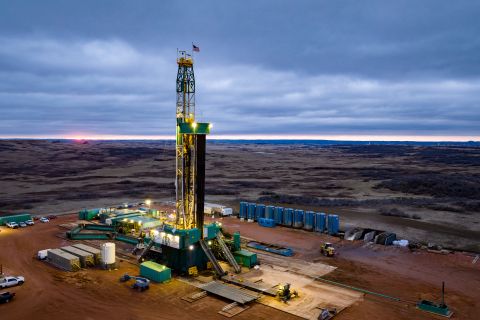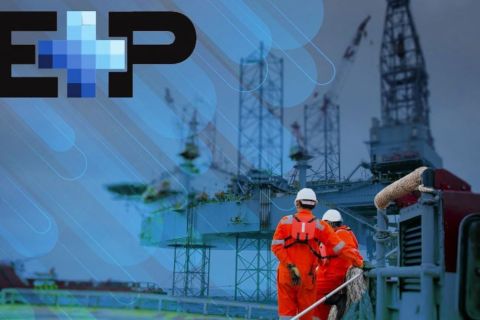
AI augments human capabilities for now, but as technology improves, it may soon control the workforce. (Source: Shutterstock)
Fears about armageddon by artificial intelligence (AI) may stem from marketing, but people are unprepared for how quickly AI could change how we work, experts said on July 6 during a Center for National Interest debate on the perils and promise of AI.
Samuel Hammond, resident senior fellow at the Niskanen Center, compared today’s AI with innovations of the past, saying the introduction of electricity and mechanization created new jobs, rather than wiping them out—a common fear with AI.

“The wealth and productivity and the labor savings that those technologies create become income for someone, and that income is in turn spent back into the economy and that creates new sources of demand for new jobs,” he said. “That being said, I think people are still unprepared for how quickly this technology is going to come and why it will look different from previous industrial revolution style events.”
These transitions have been “squeezed into shorter and shorter timeframes,” he said, and institutions may not be prepared to compress a century of progress into a few months.
He said AI wouldn’t even need to be “superhuman” or have consciousness, only to be “expert level” on tasks and be a “zero shot or few shot learner on things that humans do.”
Hammond cited a forecasting platform, Metaculus, in which experts predicted a weak form of artificial general intelligence (AGI) would be announced in 2026. Just three years ago, the forecast was for 2050. The resulting “weak” AGI is expected to be “general enough to compete with college-educated workers,” he added. Strong AGI is expected in 2031 or 2032.
There will be tipping points where workers will no longer “be augmented by AI but directly replaceable by AI, and then humans have to start thinking about what is our deeper competitive advantage,” he said.
McBride said many are talking about the threat of AI replacing a lot of jobs, and that as many as 45% of American jobs are at high risk of being automated in the future.

In fact, a July 4 CNN story pointed out that AI is already linked to layoffs in the tech industry, which created AI.
Less is more
Keegan McBride, departmental research lecturer at Oxford University, said technological innovations can transform the labor market.
“Maybe some people will have their jobs transformed. But the other side of this is the productivity of the average worker is going to increase,” he said. “If you're applying AI, it will make you more effective. It will make you more productive.”
Further, he said, the impacts of AI are likely to extend to those with lower skill sets.
“You're going to see a raising of the lowest levels of the workforce anyway, to be able to do things that they currently can't do,” he said.
In short, he said, he doesn’t see AI “wiping out…a big part of the workforce” or rising to the level that some people might expect.
“Certainly changes are coming, and there's no putting the genie back in the bottle. This train has already left,” he said.
Hammond recounted how quickly chess-playing AI improved, saying he expects similar trajectories of AI in other sectors.
“I imagine in the coming years, like this year or next year, we'll start to see medical providers, doctors and nurses having Chat-GPT-like medical assistance for diagnosis,” he said.
After feeding in certain information, “it will give you a really good, plausible diagnosis. At first those will be augmenting. It will help people manage more patients and have more accuracy.”
But at some point it could actually cause harm to the patient to have a doctor in the loop at all, he added.
“We'll see that across different sectors as well,” he added.
But how fast AI will continue to improve comes down to funding, Hammond noted. About $5 million was spent training Chat-GPT 3, while Chat-GPT 4 cost about $100 million to train, he said, and the expectation is the next iteration could cost as much as $10 billion.
“We're sort of hitting a temporary wall right now because of the cost,” he said. “In the worst case scenario, it's a short timeline to having digital brains that are as powerful or more powerful than human [brains].”
McBride called AI a tool to augment human intelligence and allow humans to do things more effectively and efficiently.
Even so, he said he’s “absolutely not scared about AI bringing around the end of the world in the near future. I don't think we're heading towards any sort of artificial intelligence-induced armageddon. It's a lot of marketing” that makes AI seem “more powerful and more innovative than perhaps that it is.”
Recommended Reading
Smart Tech Moves to the Hazardous Frontlines of Drilling
2024-10-08 - In the quest for efficiency and safety, companies such as Caterpillar are harnessing smart technology on drilling rigs to create a suite of technology that can interface old and new equipment.
Integrating OCTG Management from Planning to Well
2024-12-10 - Tenaris’ Rig Direct provides improved collaboration and communication, and more uptime.
E&P Highlights: Sept. 23, 2024
2024-09-23 - Here's a roundup of the latest E&P headlines, including Turkey receiving its first floating LNG platform and a partnership between SLB and Aramco.
Navigating the Crossroads: Oil, Gas Industry Reimagines its Role in Tech Age
2024-10-28 - The oil and gas industry has both a need and an opportunity to embrace the digital transformation while engaging the next generation of its workforce.
E&P Highlights: Nov. 4, 2024
2024-11-05 - Here’s a roundup of the latest E&P headlines, including a major development in Brazil coming online and a large contract in Saudi Arabia.
Comments
Add new comment
This conversation is moderated according to Hart Energy community rules. Please read the rules before joining the discussion. If you’re experiencing any technical problems, please contact our customer care team.






